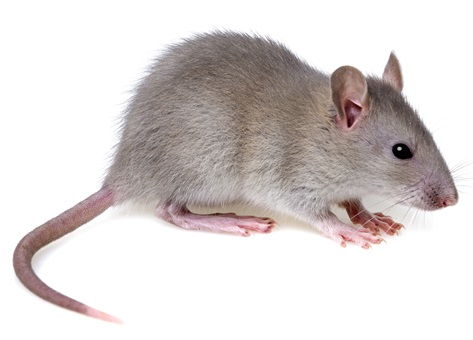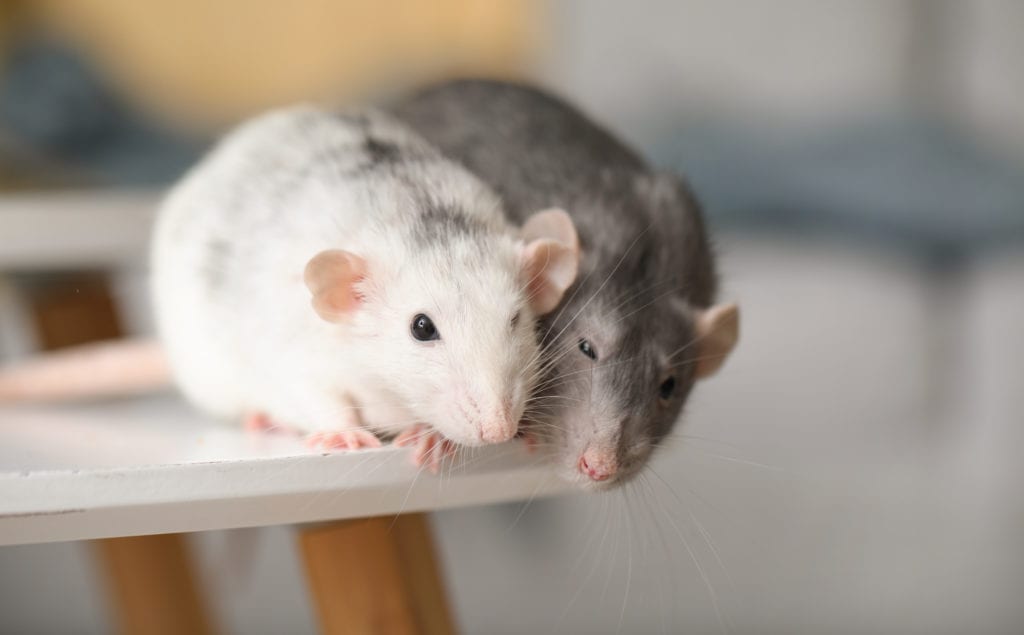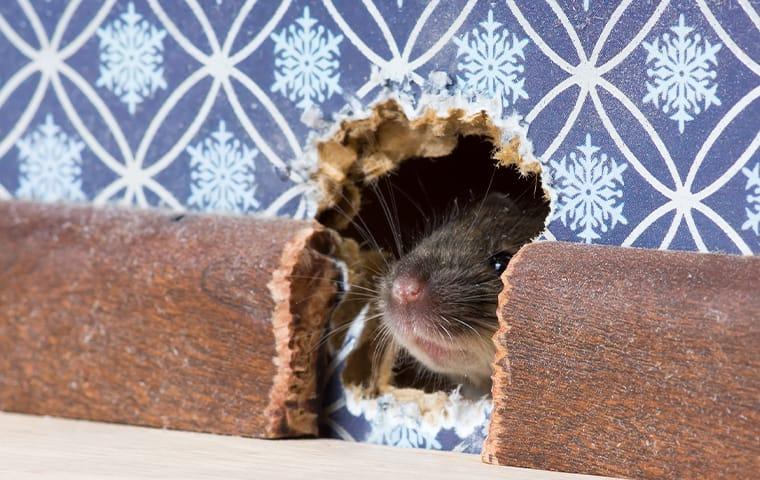Is it dangerous to have mice in the house?
That’s the short answer. A number of severe illnesses and risks to health have been linked back to mice. According to the Center for Disease Control (CDC), numerous diseases have been spread worldwide by mice. They spread the diseases directly by contact with saliva, urine and feces from mice. But, the disease can also spread indirectly through ticks, fleas, and mites.
Mice create a lot of mess. In order to mark a place as their own, they start to urinate and defecate all over the place. Not only is it messy, but the mice also excrete a lot of pathogens. This can lead to serious problems for your health. This is an example of this:
Kaytee Forti-Diet Pro Health Hamster And Gerbil Food 3Lb
Kaytee Forti-Diet Pro Health Hamster and Gerbil Food is a nutritionally complete diet for hamsters and gerbils that supports dental health through natural chewing activity. The larger, crunchy pieces help to promote dental wear while the prebiotics and probiotics support digestive health. Product Description in paragraph form: Kaytee Forti-Diet Pro Health Hamster & Ger Kaytee Forti-Diet Pro Health Hamster and Gerbil Food provides a nutritionally complete diet for hamsters and gerbils. The larger, crunchy pieces supports dental health through natural chewing activity. This formula contains prebiotics and probiotics to support digestive health.
This food was designed to support dental health and digestive health in hamsters and gerbils.
Looking for a diet that will support your hamster or gerbil’s dental health?
Look no further than Kaytee Forti-Diet Pro Health Hamster and Gerbil Food.
This food is packed with larger, crunchy pieces that will help promote natural chewing activity – promoting overall dental health.
In addition, this food contains prebiotics and probiotics to support your pet’s digestive health.
Sunseed Vita Prima Complete Nutrition Rat & Mouse Food, 2 Lbs
Sunseed Vita Prima Complete Nutrition Rat & Mouse Food is a tasty, crunchy blend of nutritious ingredients designed to help your pet’s dental health. With our unique nutrient-dense blend of ancient grains and high-quality protein sources, plus vitamins A, D, and E for optimal nutrition Satisfy your pet’s needs with Sunseed Vita Prima Complete Nutrition Rat and Mouse Food, 2 LBS. Skin and coat health are supported by this nutritious blend of ancient grains. Sunseed Vita Prima Complete Nutrition Rat & Mouse Food, 2 LBS is a balanced diet fortified with a nutrient-rich blend of ancient grains.
Rat and mouse enthusiasts will love Sunseed Vita Prima Complete Nutrition Rat & Mouse Food!
This food is fortified with essential vitamins A, D, and E, as well as a unique nutrient-rich blend of ancient grains.
Look no further than Sunseed Vita Prima Complete Nutrition Rat & Mouse Food.
This food is fortified with essential vitamins and minerals, and made with our unique blend of ancient grains for a healthy snack your pet will love.
Supreme Tiny Friends Farm Reggie Rat And Mimi Mouse Tasty Mix 2Lb
Supreme Tiny Friends Farm Reggie Rat and Mimi Mouse Tasty Mix 2lb These cute and cuddly friends will bring a smile to any pet lover’s face. This Supreme Tiny Friends Farm Reggie Rat and Mimi Mouse Tasty Mix 2lb is made of 100% natural ingredients, with no added fillers or artificial preservatives. It’s also grain-free, making it ideal for dogs with sensitive stomachs. The mix is made from high-quality proteins that are easy on the digestive tract, making it more likely that your dog Supreme Tiny Friends Farm Reggie Rat and Mimi Mouse Tasty Mix 2lb This high-quality mouse food is made with a special blend of highly digestible grains and seeds, providing the nutrition your pet needs to maintain peak health. This tasty mix is great for all life stages, but can be fed exclusively if desired. Ingredients: Wheat Fl
Rat and mouse enthusiasts will love Sunseed Vita Prima Complete Nutrition Rat & Mouse Food!
This food is fortified with essential vitamins A, D, and E, as well as a unique nutrient-rich blend of ancient grains.
Look no further than Sunseed Vita Prima Complete Nutrition Rat & Mouse Food.
This food is fortified with essential vitamins and minerals, and made with our unique blend of ancient grains for a healthy snack your pet will love.
Hantavirus is the most common form of Hantavirus. It’s found most commonly in deer mice. If the rodents come in contact with the feces or urine of other rodents, they can pass on the virus to people. What’s more, mouse feces and urine can dry and turn into a dust and that can carry the virus as well. Hantavirus starts like so many other illnesses with a fever and chills, combined with aches and pains. It is important to get it treated immediately as the condition can progress quickly and can cause severe complications such as shortness and failure of the kidneys, which can ultimately lead to death.
Salmonella- rodents, like mice, are hungry for food and will eat almost anything that they can reach with their sharp teeth and tiny feet. You might find them crawling over countertops or in your cupboards, searching for dirt or bacteria. Salmonella is the most serious of these bacteria, often referred to simply as food poisoning. It can cause severe symptoms such as diarrhea, stomach cramps and vomiting.
Lymphocytic choriomeningitis – this rodent-borne infectious disease causes serious neurological complications, such as aseptic meningitis or inflammation of the meninges around the brain and spinal chord. It’s most often carried by the house mouse. But, wild mice can infect hamsters. After being exposed to saliva or fresh urine, LCMV can be transmitted from one person to another.
Keep in mind that rodents and mice aren’t neat. They don’t bathe every day. They are also often infested with parasites such as fleas and ticks. Parasites that mice are carriers of have been implicated in several illnesses, including the following:
Lyme disease is a condition that can be transmitted by ticks. Mice often have Lyme disease with them. Infestations of ticks are possible and can cause serious health problems.

How can mice in the house pose health risks?
An infestation of mice in your home can lead to serious diseases. The risk of mice infesting your home is minimal as they do not bite unless you handle them. To make them a threat, the greatest problem is their health hazards from parasites or diseases. You can get food contaminated from them. Mice are responsible for spreading bacteria and diseases that can cause illness and even death.
Other risks include their ability to chew on wires and other wiring. They will destroy property because their teeth keep growing and in order to manage their chompers, they have to chew on wood and other hard things to keep them filed down. If they end up inside the walls, they might chew on wiring, too. If exposed wires are damaged, it can create an electrical fire.

Mouse Fact
Mice are often responsible for damage to property, and they are also known for their destructive behavior towards commercial crops. They can cause malfunctions of machinery and equipment in farms. Commercial farming businesses can suffer huge losses due to these pests. Food contaminated with mice will not be safe for human consumption.
Learn more about the food that mice eat. Mice are known to contaminate homes and surfaces with their own food. Hantavirus is a particular threat associated with particular rodents such as deer mice . Inhalation of the particles that are released from saliva, urine, and mouse droppings can lead to infection.
Consuming contaminated food can lead to a variety of diseases including salmonellosis. Within domestic environments, food contamination may be less obvious and foods may be consumed unknowingly. Electrical wires and clothing can be damaged by mice chewing. While they are building their nests in storage boxes, wires and other materials, mice also destroy them.

Keep Finding Little Rodents Scurrying Around Your House? A mouse problem is a very serious issue that can even be hazardous to your home.
Landshark1/Shutterstock When it comes to household pests, rats seem scarier to deal with than mice, right? The rats are more large than the average mouse and live in less clean areas. Compared to the rat (or other household pests that are hard to get rid of), mice seem pretty tame. However, don’t be fooled by their tiny size; mice could pose a threat to your house.
Let’s first talk about lifespan. According to the UK government’s study, mice live between 9 and 12 months. In that lifespan, the mouse does get quite busy. A mouse can become sexually active after six weeks and will be ready to begin producing young mice. In that short time span, a typical mouse will have 5-6 young mice up to 8 different times per year. That means that this little mouse can produce up to 40 to 48 tiny mice in 12 months. Consider the possibility that these tiny mice may also go sexually active and start to produce their own little mice. That, my friends, is a lot of mice.
In addition to hundreds of mice running around inside walls of your home, you will also be dealing with significant mouse activity. Mouse climbers are more agile than rats. It’s not uncommon to find mice in your pantry on top shelves. You should also throw away any mouse droppings immediately. We don’t know what may be lurking in that food!
Additionally, mice may be carriers of a number of different diseases. According to Center for Disease Control, you can find mice with Salmonellosis, Hantavirus Pulmonary Disorder, Leptospirosis, or Hantavirus Pulmonary. Lymphocytic Chorio-meningitis, which is most commonly seen in house mice (LCM), is the main disease. LCM can easily be contracted in humans by inhaling dirt from the areas where rodents urinated and dropped feces.
If you are experiencing a pest like a mice problem you need to take action immediately. We have some tips to help you get rid. This is a good time to reconsider before you start to squash that poor bug.

Are House Mice Dangerous?
It is common for house mice to infest homes. It’s believed that approximately 21 million American homes are affected by rodent infestations each year. House mice are not something to be concerned with because they are common. They don’t want house mice to enter their home, but they do not believe there is any reason for alarm if they do. The truth is that this couldn’t be further from the truth.
The dangers of house mice exist for many reasons. One reason is the potential health dangers they pose. They not only have pathogens on the bodies of house mice, but also carry them around in their feces. The pathogens spread to your home from wherever they are found. Food that has been contaminated by mice should be removed from your grocery stores. If they walk across your countertops or food prep areas without your knowledge, you can end up contracting one of the illnesses they spread.
Salmonellosis has been known to be one of the most serious diseases house mice carry. The symptoms of this type of food poisoning include nausea, diarrhea, abdominal pain, and vomiting. Also, mice can transmit the hantavirus and rat bite fever to other animals, such as mice.
Through their urine or feces, house mice can cause asthma and allergy symptoms in children. House mice can also bring parasites such as fleas, ticks and mites into the house. This can spread other potentially dangerous diseases to the family.
Not only are house mice a threat to your health, but they are also a threat to your home. When they enter your home in many different ways, mice can cause severe damage. You personal property is the first thing they will do. Anything that can be infiltrated by mice will get damaged if they are stored inside.
Your house is what should really be worried. They will create a huge mess where they nest. The nest is often where the mouse spends most of their time. They’ll contaminate the surrounding area with urine, feces and other waste. The immediate environment is not only damaged, but your family may also be affected.
Most of the damage they do is caused by their constant chewing. Rodents are microscopic rodents. Their incisors never cease growing. To keep these teeth at a manageable length, mice must continually find things to chew on to keep their teeth from getting too long. If house mice enter your home, they can damage insulation, ductwork or pipes as well as electrical wiring. Although some damage may be minor, others can lead to serious issues in your home. Leakage and mold can occur when pipes are damaged. You will have a drafty home, a lower energy consumption, and a higher risk of mildew due to urine or droppings. Inflammable wiring could cause fires.

Study in Mice reveals that Lactose in The Diet feeds dangerous gut bacteria when the Immune System is compromised
Healthcare settings are at risk from infections with the Enterococcus bacteria. Credit: Katerna Kon/ScienceSource. Infections with Enterococcus are a significant threat in healthcare environments. These infections can cause inflammation in the colon, serious diseases such as sepsis and bacteremia as well as other complications.
Patients who are undergoing stem cell transplants or bone marrow transfers (BMTs), in order to treat cancerous blood cells, should be aware that Enterococcus infection can pose a risk. Study results have shown that Enterococcus levels are linked to increased risk for graft versus host disease (GVHD). This is a condition in which the immune cells of the donor’s stem cells target the recipient’s body and cause death.
Now, an international team led by scientists from Memorial Sloan Kettering has shown for the first time that foods containing lactose, a sugar that’s naturally found in milk and dairy products, help Enterococcus thrive in the gut, at least in mice. They also studied changes in the bodies of people having BMTs. The study was published November 29 in Science.
Jonathan Peled, MSK’s physician-scientist who specializes in GVHD says the findings “indicate a possible new route to lower the risk of GVHD” and that there is a way to do this. “But they are still preliminary, and it’s too early to suggest cutting out lactose in the diets of people undergoing BMTs or other hospitalized patients who are at risk from Enterococcus.”

Microbiota Focus
For several years, Dr. Peled and Marcel van den Brink, head of MSK’s Division of Hematologic Malignancies , have been studying the relationship between GVHD and microbiota the community of microorganisms that inhabit the body. The two of them are co-senior authors of the new study.
They have previously shown that Enterococcus (and other bacteria) can dominate if the populations of harmless microbes are eliminated, usually due to antibiotic treatment. The team also examined microbiota samples taken from over 1,300 people with BMTs as part of their new research. They found a link between Enterococcus infection and GVHD.
These results suggest a new approach to reducing the chance of GVHD and other dangerous infections.
They also conducted additional Enterococcus research using cell cultures as well as mice. “Mouse models help us understand the mechanism of GVHD in our gut,” said Dr. van den Brink. She is also the Co-Director for the Parker Institute for Cancer Immunotherapy (MSK) and heads a lab within the Sloan Kettering Institute’s Immunology Program.
BMTs were given to mice. “We found that cells in their intestinal linings no longer made lactase. Lactose is the enzyme responsible for breaking down lactose. Enterococcus was decimated by the high amounts of undigested lactose. It was quite surprising to see the dominance of one type bacteria.” Dr. van den Brink adds that the antibiotic-induced loss of enterocytes from other bacteria causes problems in the stomach. “It’s a double whammy,” he says.
Are House Mice Dangerous To Humans?
Can mice be dangerous in the home? Short answer: Yes. The short answer is yes. According to the Center for Disease Control and Prevention (CDC), many diseases are spread by mice. Humans are directly exposed to the diseases through direct contacts, such as saliva, urine, feces or bites from mice, or mere touch.
Is it possible for mice to share your bed?
Is there any chance of a mouse crawling on your bed? It is possible for mice to crawl onto you in bed if they are already in your bedroom. This is a common behavior when they find the fastest route to their destination from the bedroom to cross the bed. Dec 15, 2020
Are Mouse Poisonings Possible?
Deadly Bacteria & Viruses Direct contact with an alive or dead mouse or its droppings and urine can result in death. The following viruses and bacteria can be transmitted to humans by mice: Leptospirosis can spread from rat urine into the human body and cause kidney and liver failure.
Little Mice can be dangerous
Not unlike other insects, the bites, stings, or poison of mice is not what makes them dangerous. It’s the potential health dangers that they bring to your body from diseases.
























:fill(white)